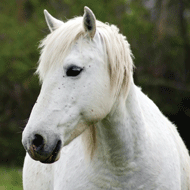Hope for rapid equine influenza test

“Preventing a new influenza pandemic requires both vaccination and antiviral drugs to be administered within 48 hours of the infection."
A simple dipstick test could offer a rapid, non-invasive method of screening for equine influenza.
Iceni Diagnostics has a patent for its approach to detecting and distinguishing between human and avian flu. The company believes that with a slight modification, the test could be used for routine screening in horses before they travel to race meets and other gatherings.
Professor Robert Field, co-founder at Iceni, said 90 per cent of infections use carbohydrate recognition to bind with targets in humans and animals. This mechanism is specific to each strain of flu, so it can be used as a sensor for the disease.
“Our sensor uses sugars tagged with inexpensive gold nanoparticles,” he explained. “If the virus is present it will stick to the particles, pulling them closer together. This creates a photophysics reaction and the sample changes colour.
“We have found that there are differences between the carbohydrate detectors in the different types of flu. It is therefore possible to use a colour change to identify presence and absence of the virus and to distinguish between them.”
Using sugars instead of more commonly used protein-based diagnostics avoids the need for cold storage, meaning the test can be used worldwide with minimal training, and gives results in seconds.
According to Professor David Russell, chief scientist at Iceni, the new assay based on gold nanoparticles is much faster than current tests.
“Preventing a new influenza pandemic requires both vaccination and antiviral drugs to be administered within 48 hours of the infection in order to contain the disease,” he said.
“Current methods of detection require isolation and culturing of the virus, which may take several hours or even days to get the results. Using our test it would be possible to quickly identify infected animals at the stables and quarantine them, preventing the spread of disease.”
Iceni is now looking for investment to modify its sensor to produce a dip test for equine flu.



 RCVS Knowledge has welcomed Professor Peter Cockcroft as editor-in-chief for Veterinary Evidence.
RCVS Knowledge has welcomed Professor Peter Cockcroft as editor-in-chief for Veterinary Evidence.